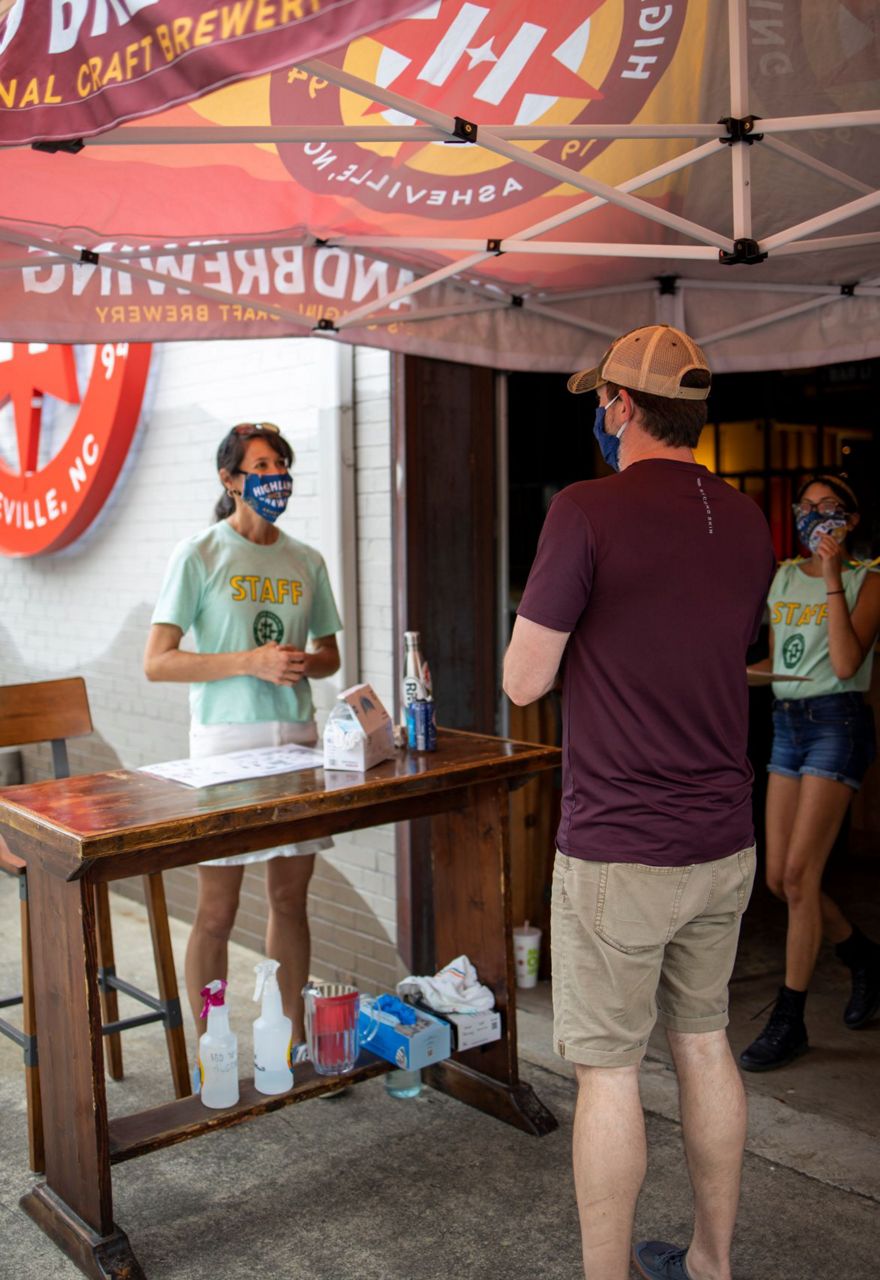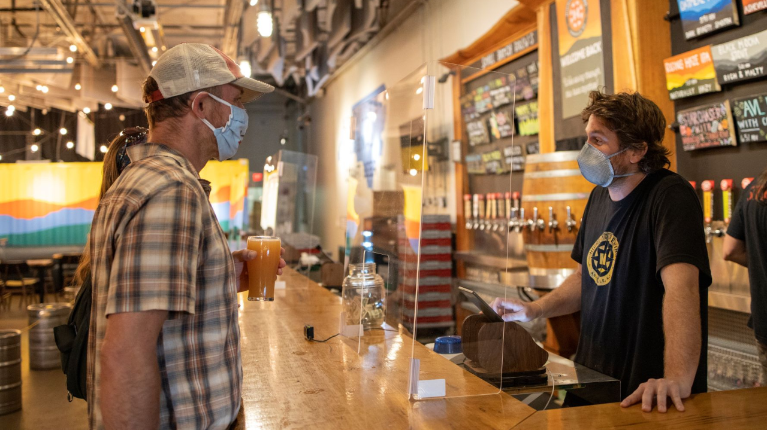When Gizmo Brew Works opened a new taproom on Franklin Street in Chapel Hill in January, there was no way to know that the university across the street would shut down just two months later as the coronavirus pandemic spread across the country.
The Raleigh brewery’s foray into Chapel Hill had been in the works for over a year, but the bar has been closed since March, Gizmo co-founder Bryan Williams said.
They’ve opened a bottle shop in the space to try to make a little money as bars remain closed. But most University of North Carolina students, the built-in customer base for the taproom, were sent home in the spring and many have not returned.
“That was supposed to be our cash cow, and now it’s just a money pit,” Williams said in an interview with Spectrum News 1.

Williams said Gizmo, like every other craft brewery in the state, has had to adapt their business model to the pandemic.
There are about 330 craft breweries in North Carolina, according to Richard Greene, executive director of the North Carolina Craft Brewers Guild. This year at least 10 new breweries have opened, he said, and 14 have closed.
Seven of those breweries permanently shut down because of the COVID pandemic, Green said.
Last year, Greene said, 35 new breweries opened up in North Carolina and 14 shut down.
The guild has been working with its member breweries and the state to craft guidelines to help breweries reopen and keep customers safe. The guild is also helping its members negotiate the issues with on-premise versus off-premise beer sales, getting help from COVID relief funds and generally trying to keep their heads above water through the coronavirus pandemic.
Most breweries are relying more on canning their beer more than they ever planned to, a much more expensive process than filling kegs.
But breweries, unlike bars and nightclubs, were allowed to reopen with restrictions in Phase 2 of North Carolina’s reopening plan.
The saving grace for Gizmo this summer has been their large outdoor space at their Raleigh brewery where people can come and maintain social distancing while still getting out of the house and buying beer from the tap.
The same has been true for other breweries, which tend to be located in industrial or outlying areas without plenty of outdoor space.
On a recent weekend in Charlotte, hundreds of people filled socially distanced picnic tables at Olde Mecklenburg Brewery. People were required to wear masks when they got up from their tables to order beer or a bratwurst at outdoor serving areas.
A band played in one corner of the outdoor beer garden, piped through speakers around the massive space in Charlotte’s Rosemont neighborhood.
People lined up six feet apart to buy pints from an outdoor serving station at Sycamore Brewing on a recent Sunday in Charlotte. Business was credit card only to avoid handling cash. The busy bartenders served up favorites like their Mountain Candy IPA and more seasonal brew like their Cheeky Peach Ale.
A food truck called “No Forks Given” specializing in Cuban food served sandwiches and empanadas from the parking lot as a live band set up in the grass.

It’s these big outdoor spaces that have helped many breweries weather the pandemic, according to Greene, with the Craft Brewers Guild.
Breweries were able to reopen at 50% capacity in late May. “On-premise sales has really helped,” Greene said.
In Asheville, Highland Brewing, one of North Carolina’s biggest craft breweries, people have flocked back to the brewery since they reopened, according to Highland president and CEO Leah Wong Ashburn.
Highland has 40 acres in the mountains, including a meadow where they’ve been able to hold concerts for thousands of people.
“One of the things Highland is blessed with is a lot of space,” she said. Even with all that space, Highland had a wait for people to get in last weekend.
“Being outdoors this time of year has been good,” Greene said in a phone interview. But, he said, “The winter is going to be challenging.”
At Gizmo, Williams said they have a fire pit outside their Raleigh brewery to help keep customers warm when cooler weather moves in and they’re looking at buying outdoor space heaters.
“When it's not nice enough to be outside, our occupancy goes down from 100 to 20 (people),” he said.
For Greene, he’s been most concerned about smaller breweries that don’t have big outdoor space for customers to spread out.
During Phase 1 and Phase 2 of the governor’s coronavirus restrictions, breweries have been relying heavily on canning their beer for pickup, delivery or distribution to retailers. But canning is a lot more expensive, Greene said.
Brewers can put 15 gallons in a keg “and out it goes” to a restaurant or bar, he said. “But 15 gallons goes into how many cans?” Greene said.
The actual volume of beer being sold by craft breweries has been OK, but the profit margin is a lot tighter for small breweries.
Williams said Gizmo has been using a mobile canning service to get their beer packaged for off-premise sales. Basically a truck pulls up with an entire production line to can their beer.
“Almost all of the beer we’re selling now is canned,” Williams said.
“It’s not cheap,” he said. “But you don’t have to make that investment of several hundred thousand dollars” to have your own canning production line.
Williams said Gizmo is getting ready to make that big investment for their own canning line. “It’s not going to help us now, but it will in the long term,” he said.

Makai Brewing, a much smaller operation in Ocean Isle, started with a business model that focused on taproom sales. “We’re kind of having to reinvent ourselves,” owner and brewmaster Lowell Puckett said in an interview.
“Now we’re almost all distribution,” he said. His peak season should be right now in the taproom in the southeast corner of North Carolina, Puckett said.
He said Makai just got their own small canning system that will be ready to start processing cans next week.
But not only does Makai have to contend with social distancing restrictions, there are fewer tourists visiting the nearby beaches to stop in for a local brew.
Highland Brewing has also seen their can sales spike, and keg sales have started to come back.
“We’re now doing an incredible amount of volume packaged,” Highland’s Ashburn said. She said one bright side is that they’ve had to add jobs to the canning and packaging operation since demand has been so high in grocery stores.
“We can adjust and be OK,” she said. “Keeping beer on shelves, that’s what we have to do.”
For Greene, he’s not worried about big, well capitalized breweries like Highland. They will make it through the pandemic.
He’s worried about the smaller brewers that may not have the capital and the flexibility to take on debt to make it through.



